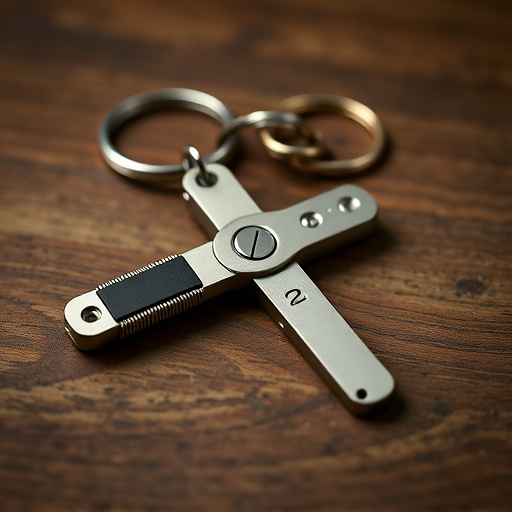Understanding the legality of metal keychain defense tools is crucial before using them for self-defense. US states have varying regulations regarding open or concealed carry, with some prohibiting keychains entirely and others allowing them under specific conditions like hunting or law enforcement. Keychains designed for offensive capabilities, such as sharp points or edges, are considered weapons and may require licensing or permits. Familiarize yourself with local laws to ensure responsible and lawful usage.
“In today’s world, personal safety is paramount. Exploring the legality of metal keychain defense tools offers an intriguing perspective on self-defense options. This article delves into the intricate details of state laws regarding the carriage of such devices for protective purposes. From understanding what constitutes a legal keychain weapon to navigating public carry guidelines, we provide a comprehensive guide. Discover the factors shaping the legal landscape of metal keychain defense and gain insights to make informed decisions in diverse jurisdictions.”
- Metal Keychain Defense Tools: A Legal Overview
- Understanding State Laws on Carried Keychains
- When Is a Keychain Considered a Weapon?
- Carry Guidelines for Self-Defense in Public
Metal Keychain Defense Tools: A Legal Overview
Metal keychain defense tools have gained popularity as a means of personal protection, but their legality varies greatly across states in the US. When it comes to metal keychains designed for self-defense, understanding local laws is crucial before considering carrying such a device. Each state has its own set of regulations regarding what constitutes legal carry, and the definition of a “defense tool” can be nuanced.
In many jurisdictions, metal keychains with built-in sharp edges or spikes are considered offensive weapons and are prohibited for open carry. Some states allow these tools to be carried concealed, but strict restrictions on size, shape, and potential harm apply. It’s essential to research specific laws in your state to determine if a metal keychain defense tool is legal for you to possess and carry, ensuring you stay within the boundaries of the law to avoid legal consequences.
Understanding State Laws on Carried Keychains
In the United States, the legality of carrying defensive keychain tools varies significantly from state to state. Before considering a metal keychain defense tool as a personal safety measure, it’s crucial to understand your local laws. Many states have specific regulations regarding the types and sizes of self-defense weapons that can be carried openly or concealed, with keychains often falling into a grey area. Some states explicitly prohibit the open carry of any weapon, including keychains designed for defense, while others allow it under certain circumstances, such as during hunting or for law enforcement personnel.
For those seeking to legally carry a metal keychain defense tool, understanding “stand your ground” laws and local hidden carry regulations is essential. Some states have more lenient rules, enabling individuals to defend themselves if they feel their safety is threatened, without explicitly mentioning keychains. However, others may require specific licensing or permits for concealed carry, with detailed specifications regarding weapon size and design. Always consult your state’s official legal resources or contact local law enforcement for the most accurate and up-to-date information on metal keychain defense tools’ legality.
When Is a Keychain Considered a Weapon?
In the context of self-defense, a metal keychain can be more than just a convenient accessory—it could serve as a legal weapon under certain circumstances. The key question is: When does a small, seemingly innocuous keychain cross the line from everyday item to defensive tool? Legal definitions often focus on factors like design, intent, and the potential to cause harm. A metal keychain that has been designed or modified for offensive capabilities, such as a sharp point or edge, could be considered a weapon. The material itself—especially if made of sturdy metals like steel or aluminum—can enhance its capability to inflict injury when used with the intent to protect oneself or others from imminent physical harm.
It’s essential to remember that not all keychains are created equal in terms of legal status. A simple, unmodified metal keychain attached to a set of keys is unlikely to be viewed as an illegal weapon. However, if that same keychain includes retractable blades, spikes, or any other sharp components, the legal landscape changes significantly. The line between a legal defense tool and an illegal weapon can sometimes be subtle, making it crucial for individuals considering carrying such items to understand their region’s specific laws and regulations related to metal keychain defense tools.
Carry Guidelines for Self-Defense in Public
When considering carry guidelines for self-defense in public, it’s crucial to understand the legalities surrounding metal keychain defense tools. While small and convenient, these tools can be effective in certain situations, their use is subject to regional laws and regulations. Always check local statutes to ensure compliance; some areas permit defensive keychains under specific circumstances, while others may restrict or ban them entirely.
To remain within the legal framework, familiarize yourself with the definition of “legal self-defense” in your jurisdiction. This knowledge will help you discern when and how a metal keychain defense tool can be employed responsibly. Remember, possessing and carrying such tools comes with responsibilities; understand your rights and duties to ensure a safe and lawful experience.
In conclusion, navigating the legal carry guidelines for metal keychain defense tools requires understanding state laws and knowing when a keychain is considered a weapon. By adhering to self-defense carry guidelines in public, individuals can ensure they remain within legal boundaries while protecting themselves. Remember that staying informed about your rights and responsibilities is crucial when carrying any self-defense tool, including metal keychains.
